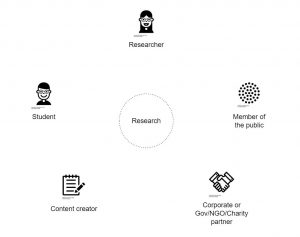Over the last few months, the OneWeb Research team (Andrew Lamb, Andrew Larcombe, Jo Caley, Maya Wiseman, Neil McWhinnie and Richard Lakin) were tasked with carrying out a Discovery exercise on Research at UoS.
For readers who might be unaware, during a Discovery the team seeks to find out:
- who the users of the potential digital service are,
- what problems they have, and
- what can be done to improve the experience for them.
Clearly “Research” is a huge topic that touches many parts of our university, so in order to make the Discovery more manageable we split it into two key areas, Research Excellence Framework (REF) and Research Content.
We reported our REF findings in early June after speaking to many researchers and staff from the various professional services at the University.
We came up with two hypotheses:
- how to improve Impact Case Studies with a significant Public Engagement element for REF2021
- changes to the identification, creation and reporting on Impact throughout the lifecycle of a research project
In this post we will focus on our work into Research Content, which at the time of writing is still ongoing, but nearly complete.
The problem we are trying to solve
So, what do we mean by Research Content? Simply, any online content that contains references to, or is part of, some research being undertaken at the University.
Our University harbours impactful, highly evaluated and newsworthy research. Yet students, faculty and staff, and members of the public are often unaware of research content that may interest or benefit them.
OneWeb is exploring ways to expose and communicate academic research at the University effectively and in a way that serves its diverse users – the people who produce, fund, communicate, evaluate, and apply this research.

Why this is important
The value of research in the Higher Education sector cannot be understated. The UK is a world leader and research accounts for over £1 billion of overseas investment (source: Universities UK).
Our University is a research-intensive university, and a significant revenue derives directly from research. Research is also vital to maintain the reputational value the university gains from the cutting edge researchers working here.
What we did
We initially approached the School of Geography and Environmental Sciences (SoGES) to understand how they organise their content, both from a school and research project perspective.
We then attended the SoGES away day where we gave a presentation about the importance of taking a user-led and consistent approach to creating our digital content. We spoke to many researchers and watched some early-career researchers explain their current research.
During the past few weeks we’ve been carrying out an intensive period of user research sessions where we interviewed over 30 people including students, researchers, external funders, content creators, and colleagues in professional services. This helps us to start drawing out a picture, supported with evidence, of their needs and the context they’re in when they look for research-related content.
We also carried out competitor analysis work to understand how our research stacks up against other HE institutions and search engine optimisation (SEO) analysis to identify what people are searching for when they arrive on our research pages. We also looked at the internal systems we use to deliver content to users.
What we learned
As we mentioned above, we’re still in the process of synthesising our results. We’re looking as widely as possible for evidence and will compare what we think we know more widely, but there are a few common themes that are already surfacing across the work:
Researchers and research-focussed students are already creating some compelling useful content, but they’re not necessarily looking at it in a holistic way. We know it competes for users’ attention with other content created by other University colleagues.
People matter – people search for names (of our researchers, or research groups and projects). It is about individuals and there is a careful balance that needs to be struck with brand reputation of the University as a whole. This is also consistent with the rest of the sector.
Surfacing relevant content at the right place and time for those who need it is difficult. The burden remains largely on the user to find what they’re looking for. Many systems and processes in place are making it too difficult to re-use research content across the University digital estate.
What’s next
We’re forming a plan to make meaningful change for users in this area, but our direction of travel is one that involves recommending changes in a number of areas including policy, infrastructure and content delivery.
Thank you 👏
We’d like to thank our great collaborators from across the whole of the University, who gave us their time so freely and at short notice.
We enjoyed meeting you, hearing from you and listening to your individual stories. This has helped us shape the next steps and recommendations. We’re also looking to talk to more of you. More to follow soon.
Finally, this article would not have been possible without Andrew Larcombe’s words about the team’s work and approach 🙌